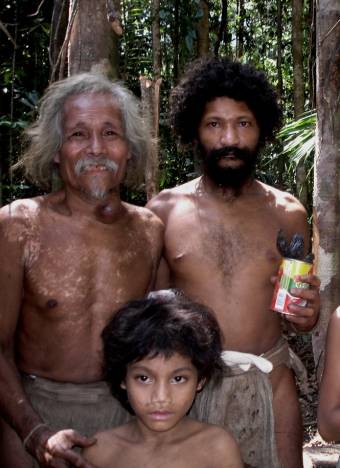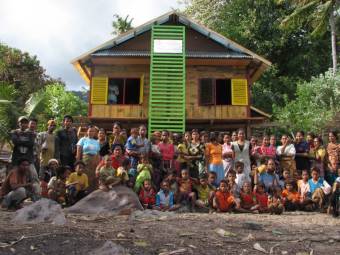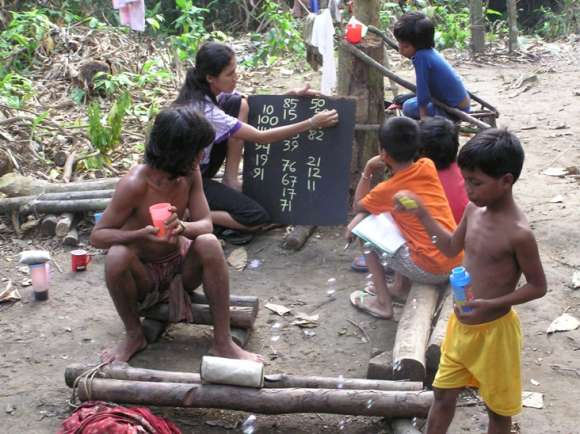Volunteers bring alternative education to marginalised communities
Butet Manurung
A jungle school with Orang Rimba: slowly turning heads.Dodi Rokhdian |
I taught groups of four to eight students. Our classroom was any available space in the jungle, with a simple jungle shelter to sleep in. We used a hand held blackboard, or traced letters and numbers in the sand with sticks. We studied when the kids were interested and quit when they were bored – they would not respond well to enforced study hours. In order to be accepted, and to be able to understand what they needed, I learned about their lifestyle. My students taught me how to avoid breaking taboos, how to survive in the jungle, which snakes were dangerous, how to make fish traps, what to do when a bear approaches, and so on. Each month I spent several weeks in the jungles of Jambi, teaching different groups of students. This is the life I led when I ran informal schools in the jungles of Jambi, Sumatra, with Orang Rimba groups.
Many children from isolated or indigenous groups in Indonesia do not attend school, due to their distance from schools, the costs involved, or their nomadic lifestyle. In some cases, the parents do not consider school useful, or even consider it harmful. At the same time, many of these indigenous groups are fighting to preserve their lifestyles and environments as the outside world encroaches on them. These children need education so they can face these changes and pressures, and struggle for the rights of their ethnic groups. But the education they need is not necessarily the one which mainstream schools provide.
Our classroom was any available space in the jungle
Sokola is a volunteer-run organisation which offers appropriate education and support to indigenous groups experiencing disruptions in their lifestyle and environment. Our volunteers approach these groups wherever they live, move with them if they are nomadic, gradually build a relationship of trust, and offer informal education. We assess their needs and listen to what they want from education. We call this a ‘life school’ approach – rather than focusing on academic skills, we address the current problems facing the community. The goal is not to force them to become ‘modern citizens’ through standardised education, but to help with literacy and other skills which will them enable to pursue their own goals, whatever they are.
Orang Rimba – the first jungle schools
 |
A Forest Tobelo family, northern Halmahera.Deddi Shalab |
The Sokola system grew out of my experience as an education facilitator for the Orang Rimba in Bukit Duabelas National Park, Jambi province. The Orang Rimba are a semi-nomadic people, who engage in hunting and gathering but also plant cassava in the jungle. Those living near villages at the edge of the jungle also tap rubber trees and plant dry rice. Their jungle is shrinking, though, due to illegal logging and plantation development (see ‘The Disappearing Forest: Orang Rimba Assert Their Rights’ , Inside Indonesia 80, 2004). Many Orang Rimba have already abandoned their jungle lifestyle and indigenous religion, while others seek to continue their lifestyle but are facing a losing battle. Orang Rimba children rarely attend school, but their lack of education makes it hard for them to deal with the loggers who are cutting down their jungle, and allows external village-based traders to take advantage of them when they trade jungle products such as dammar gum.
In 1999 a conservation NGO called Warsi hired me as an ‘education facilitator’, to establish contact with the Orang Rimba and then make recommendations to the local government about their educational needs. Warsi was interested in protecting the jungle from illegal logging, and was also concerned about the rights of the Orang Rimba. They had sent in several anthropologists before me, but all efforts to offer education had failed. My immediate predecessor died of malaria. Before that, the Orang Rimba often avoided contact entirely by running away whenever they saw an outsider approaching. On other occasions, initial contacts were ruined when the visitor unintentionally broke a taboo. For instance if one praised the beauty of a baby, this was tantamount to bringing misfortune upon it. If Orang Rimba suffered sickness, they would often blame this on the arrival of the outsider.
The Orang Rimba had a strong distrust not only of outsiders, who they call ‘people of the light’ (because they don’t live in the dark jungle), but of schools. They distrusted schools, since it was ‘schooled’ people who were cutting down their jungles and exploiting them. They also feared that if their children went to public school, they might leave the Rimba lifestyle and culture behind, and settle in a village. This did happen sometimes, and these settled Rimba people often facilitated logging of the jungle, as they knew the locations of valuable trees and needed money for their new lifestyle.
Loggers have murdered Orang Rimba when they got in the way
After seven months of persistent effort, I established relations with several different Orang Rimba groups. Perhaps they found me less threatening because I am a woman, although Rimba women were sometimes jealous if I spoke ‘secret language’ (the Indonesian language) with their husbands. I learned the Orang Rimba language (bahasa Rimba), and spent most of my time with children. Rather than facilitating their entry into normal schools, I decided to provide them with literacy training in the jungle, moving where they moved, and fitting teaching hours around their other activities such as fishing and hunting. This was to become the model for Sokola.
Showing results
The focus on basic literacy and numeracy brought results which the Orang Rimba came to appreciate. The children were able to help their parents in calculating the prices they should receive for their jungle products, so they wouldn’t be tricked by traders. When villagers living on the edge of the jungle proposed a contract with the Orang Rimba about the boundaries of Rimba territory, the children could read the contract rather than just listening to what the other side claimed it said. After some initial success like these, and after the Orang Rimba saw that I was not trying to take the children out of the jungle, they became more enthusiastic about education. Eventually I had a core group of successful students who began travelling to other Rimba groups to teach them literacy.
Living with the Orang Rimba I was aware that the most important challenge they faced was the loss of their jungle to illegal logging. Literacy helps in this struggle, but they also needed more knowledge about how to deal with the modern Indonesian legal system. These were the ‘life skills’ we taught, sometimes bringing in other NGOs to provide education on legal rights. However, more than just education was needed to empower the Orang Rimba to fight for their jungle. In the past loggers have murdered Orang Rimba when they got in the way. We assisted the Orang Rimba to form a group which struggles for their rights through formal channels. Members of this group have travelled to Jakarta to report the Jambi Forestry Department to the National Commission on Human Rights and the National Parliament, for failing to prevent illegal logging.
This struggle brought Warsi’s conservation and education agendas into conflict
This struggle brought Warsi’s conservation and education agendas into conflict. The Bukit Duabelas jungle was designated a National Park in 2000, and although this was useful in the fight against illegal logging, people are not allowed to live in National Parks according to Indonesian law (Indonesian law also does not recognise the rights of mobile groups). The shrinking jungle means that the Orang Rimba can not survive from hunting and gathering alone, but their rubber tapping and planting of dry rice puts them in contravention of National Park regulations. I decided that I needed to part ways with Warsi and the conservation agenda, in order to stay true to the empowerment approach and protect indigenous rights. In 2003 I left Warsi and established Sokola, in order to continue my work with Orang Rimba and expand it to other groups.
The Sokola approach
 |
A new SOKOLA building in Wailago village, Flores. Our only school
|
Our jungle schools in Jambi received national attention, and volunteers were coming forward who were willing to take this approach to other indigenous groups confronting environmental threats. Over the past five years, we have continued to work with the Orang Rimba, and have also supported indigenous groups in Maluku, Sulawesi, and Flores. Sokola has no office and no donor funding. It is run by 21 extremely dedicated volunteers who commit to working for at least three months, agree to Sokola’s non-paternalistic values, and can pay for their own transportation costs. These volunteers travel to remote locations around the country, sometimes living for months in the jungle, following the movements of nomadic groups.
While some of our volunteers have been with us long term, others left jobs in accounting, IT, media or business to become Sokola volunteers for some months, re-entering the work force after their savings ran out. Sokola pays for their food and medical costs, obtaining funds from personal donations and merchandise sales. Medical costs can be high – our insurance company recently doubled our premiums after many of our volunteers caught malaria or typhoid and spent time in hospital. Funding has been offered by mining companies working near indigenous groups, but we don’t accept it, since such funds would compromise our position of supporting indigenous groups against those who threaten their livelihoods and cultural survival.
Different needs for different groups
Sokola now works with a number of groups around Indonesia, who are facing a variety of challenges. In Sikka, Flores, we are working with one group from Egon subdistrict who live in mountainous territory, and a second group who lives on an island some distance from the mainland. These groups are not used to sending their children to school, partly because of the distance and danger involved in the journey. Initial education with the island group focused on improving marketing of the seaweed they cultivate, so that they know the market prices and can calculate where it is best to sell their produce after taking account of how much it costs to buy the boat fuel they need to get to different markets.
We have begun to work with several Forest Tobelo groups in Halmahera, North Maluku. The Tayawi and Totodoku groups are both nomadic, and transmigration sites, mining interests, and plantations are encroaching on their lands. The government attempted to settle some of these people in a housing project. Such settlement of nomadic groups often fails, however, as the transition in lifestyle is forced, sudden, and poorly planned. Just as has occurred with the Orang Rimba in Jambi, many of these houses have been abandoned as people return to the forest.
We work with urban poor in Makassar, and a group of Kajang people in Bulukumba, South Sulawesi, who face encroaching plantations. We also began working in disaster areas after the December 2004 tsunami in Aceh, offering education and support to refugees, and did so again for victims of the May 2006 Yogyakarta earthquake.
Our experiences around the country have convinced us that education for indigenous groups needs to be aimed at what those groups need. It also needs to be delivered in a much more flexible manner than the government system can provide. Rather than seeing nomadic or isolated indigenous groups as naked primitives who need modern schooling and a modern religion, we see them as needing appropriate forms of education, support, and protection as they face the challenges of adapting to a world which is encroaching on them from all sides. Sokola is just a committed group of volunteers. But the need for the kind of education we provide is very great. ii
Butet Manurung (butet_manurung@yahoo.com ) established Sokola. She was a Time magazine ‘Hero of Asia’ (2004), ANTV’s 2004 ‘Woman of the Year’ for education and the winner of a LIPI Man and Biosphere Award (2001). This article was translated and edited by Blair Palmer based on interviews with the author.



